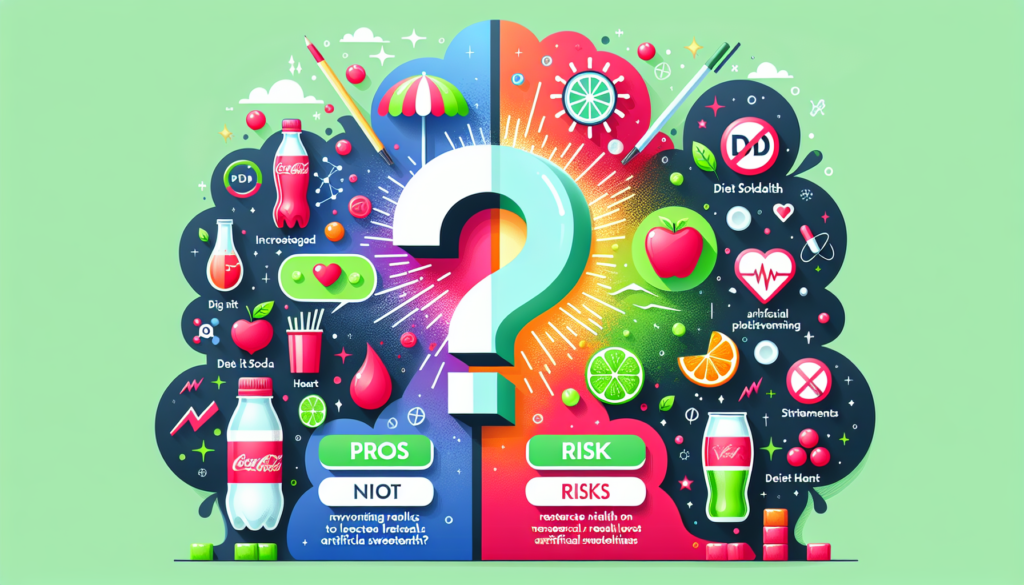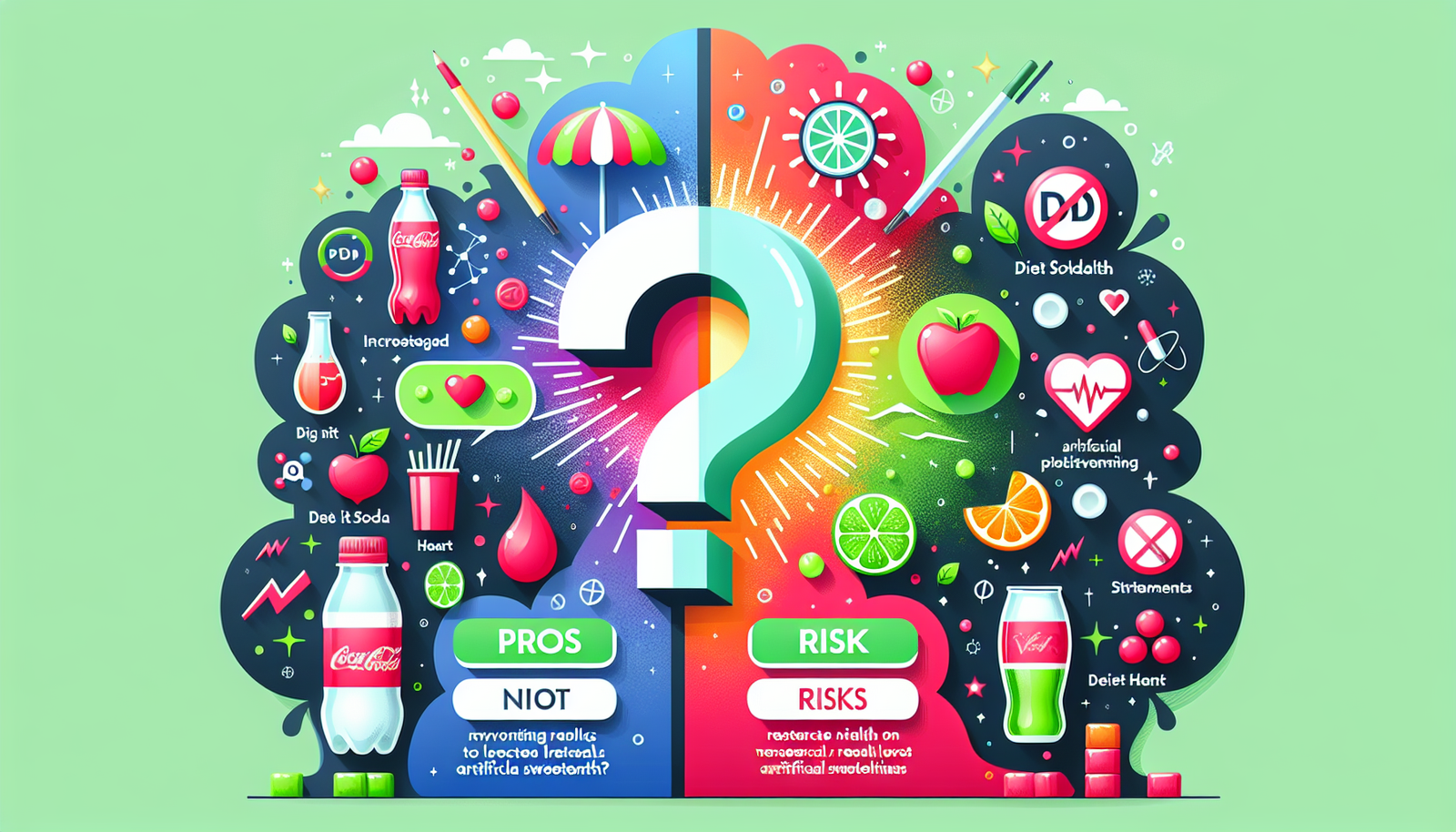You’ve probably heard people rave about diet soda, claiming it to be a guilt-free alternative to regular soda. But what’s the deal with diet soda? Is it really as good as it’s made out to be? In this article, we’ll explore the pros and cons of diet soda, uncovering the truth behind its supposed health benefits and potential drawbacks. Get ready to challenge your assumptions and discover whether or not diet soda deserves a spot on your grocery list.

Health Concerns
Artificial Sweeteners
Artificial sweeteners are the primary ingredient in diet soda, providing the sweet taste without the added calories of regular soda. However, there have been concerns raised about the safety of these sweeteners. While they are approved by regulatory bodies like the Food and Drug Administration (FDA), some studies have suggested potential health risks associated with their consumption.
Weight Gain
Contrary to popular belief, drinking diet soda may actually contribute to weight gain instead of helping with weight loss. Research has shown that artificial sweeteners can disrupt the body’s natural metabolism and increase the risk of weight gain over time. This phenomenon may be due to the way our bodies respond to artificial sweeteners, causing us to crave more sugary foods and consume additional calories.
Metabolic Syndrome
Metabolic syndrome is a cluster of conditions, including high blood pressure, high blood sugar levels, excess body fat around the waist, and abnormal cholesterol levels. Studies have suggested that the consumption of diet soda may be linked to an increased risk of developing metabolic syndrome. This is likely because diet soda can negatively affect the body’s insulin response and promote insulin resistance, leading to metabolic disturbances.
Type 2 Diabetes
Type 2 diabetes is a chronic condition characterized by high blood sugar levels. It has been found that regular consumption of diet soda may increase the risk of developing type 2 diabetes. The artificial sweeteners in diet soda can disrupt the body’s ability to regulate blood sugar levels properly, potentially contributing to insulin resistance and the development of diabetes.
Cardiovascular Health
Drinking diet soda has also been associated with an increased risk of cardiovascular disease. Research has shown that regular consumption of diet soda may lead to elevated blood pressure and an increased likelihood of developing heart disease or experiencing a heart attack. This could be due to the effects of artificial sweeteners on blood vessel function and inflammation within the body.
Bone Health
Some studies suggest that the consumption of diet soda may negatively impact bone health, increasing the risk of conditions like osteoporosis. The phosphoric acid found in diet soda can leach calcium from the bones, leading to decreased bone density over time. Additionally, the displacement of calcium-rich beverages like milk with diet soda may further contribute to this potential risk.
Kidney Health
There is evidence to suggest that regular consumption of diet soda may have a detrimental effect on kidney health. The high levels of phosphorus found in diet soda can strain the kidneys, potentially leading to a decline in renal function over time. Moreover, the artificial sweeteners used in diet soda have been linked to an increased risk of kidney damage and the development of kidney stones.
Debunking Myths
Myth: Diet Soda Helps with Weight Loss
One common myth surrounding diet soda is that it can aid in weight loss. However, as mentioned earlier, research suggests the opposite may be true. While diet soda does not contain the same amount of calories as regular soda, its artificial sweeteners can disrupt the body’s metabolism and increase cravings for sugary foods. This can ultimately lead to weight gain rather than weight loss.
Myth: Diet Soda is an Alternative to Water
Another myth is that diet soda can be considered a suitable replacement for water. While staying hydrated is essential, diet soda should not be substituted for water. Water is necessary for proper bodily functions, while diet soda provides no nutritional value. It is always best to consume an adequate amount of water throughout the day to maintain optimal health.
Myth: Diet Soda is Safe to Consume in Large Amounts
There is a misconception that because diet soda is labeled as “diet” or “zero-calorie,” it is safe to consume in large quantities. However, excessive intake of diet soda can still have negative health effects due to the artificial sweeteners and other potentially harmful ingredients. Moderation is key when it comes to consuming any food or beverage, including diet soda.
Effects on the Body
Impact on Hunger and Cravings
One significant effect of diet soda consumption is its impact on hunger and cravings. Research suggests that artificial sweeteners can disrupt the body’s natural hunger and satiety signals, leading to increased hunger and cravings for sweet foods. This can make it more challenging to maintain a balanced diet and control calorie intake, potentially leading to weight gain or difficulty in weight management.
Effects on Gut Health
Artificial sweeteners in diet soda can also have an impact on gut health. Studies have found that the consumption of diet soda can alter the composition of gut bacteria, potentially contributing to metabolic disorders and gastrointestinal issues. Maintaining a healthy balance of gut bacteria is crucial for overall well-being, and regular consumption of diet soda may disrupt this balance.
Changes in Taste Preferences
Drinking diet soda can have a long-term impact on taste preferences. The intense sweetness of artificial sweeteners can dull the taste receptors in the tongue, making naturally sweet foods, like fruits, taste less appealing. This can lead to an increased preference for overly sweet and processed foods, which may have negative implications for overall dietary quality and health.
Potential for Addiction
Some evidence suggests that diet soda may have addictive properties. The combination of the intense sweetness and the rewarding feeling associated with consuming diet soda can create a reliance on these beverages. This potential addiction can lead to a cycle of cravings and consumption, making it challenging to reduce or eliminate diet soda from one’s diet.
Cancer Risk
Research on Cancer Link
There has been ongoing research investigating the potential link between diet soda consumption and cancer. While some studies have shown a possible association between the two, more research is needed to establish a definitive link. Currently, regulatory bodies like the FDA consider artificial sweeteners used in diet soda to be safe for consumption, but ongoing monitoring and research are still being conducted.
Role of Artificial Sweeteners
Artificial sweeteners, such as aspartame and saccharin, have been the subject of scrutiny regarding their potential role in cancer development. However, the current scientific consensus is that artificial sweeteners are safe for consumption within the recommended daily limits set by regulatory authorities. It is essential to note that moderation is always key when consuming these sweeteners, and exceeding the recommended limits should be avoided.

Effects on Teeth
Erosion of Tooth Enamel
The high acidity and sugar content found in both regular and diet soda can contribute to the erosion of tooth enamel, leading to dental health issues. While diet soda may not contain as much sugar as regular soda, the acidity can still cause damage to the teeth over time. It is essential to practice good oral hygiene habits, such as brushing and flossing regularly, and to limit the consumption of sugary and acidic beverages to maintain dental health.
Dental Caries
Dental caries, or cavities, can also be a concern when consuming diet soda. The combination of acid and sugar substitutes found in diet soda can create an environment that promotes the growth of harmful oral bacteria, leading to tooth decay and cavities. To prevent dental caries, it is crucial to practice good oral hygiene and limit the consumption of sugary and acidic beverages, including diet soda.
Pregnancy and Diet Soda
Safety Concerns
When it comes to pregnancy, it is generally recommended to limit the consumption of artificially sweetened beverages, including diet soda. The potential risks to the developing fetus from the chemical ingredients found in these beverages are not fully understood. Pregnant individuals should consult with their healthcare provider for personalized recommendations regarding the consumption of diet soda during pregnancy.
Potential Risks
There is limited research on the specific effects of diet soda during pregnancy. However, some studies have suggested a potential increased risk of preterm birth and lower birth weight associated with the consumption of diet soda during pregnancy. It is crucial to prioritize a balanced and varied diet, focusing on whole foods and hydrating with water or other approved beverages recommended by a healthcare provider.
Mental Health
Association with Depression
Studies have indicated a potential association between the consumption of diet soda and an increased risk of depression. While further research is needed, it is hypothesized that the artificial sweeteners in diet soda may affect certain neurotransmitters and brain chemicals, potentially contributing to depressive symptoms. Maintaining a balanced diet that focuses on whole foods and avoiding excess consumption of diet soda may support mental well-being.
Effects on Cognitive Function
Some research suggests that regular consumption of diet soda may have negative effects on cognitive function, including memory and learning ability. However, more studies are needed to establish a definitive link between diet soda consumption and adverse cognitive outcomes. A balanced diet that includes nutrient-dense foods and limits the intake of diet soda may support optimal cognitive function.
Marketing and Misleading Claims
Advertising Tactics
The marketing and advertising tactics used by the beverage industry often depict diet soda as a healthier alternative to regular soda, promoting it as a way to enjoy a sweet beverage without the calories. However, it is essential to critically evaluate these claims and understand the potential risks and health concerns associated with diet soda consumption. Relying solely on marketing messages may lead to misinformation and an incomplete understanding of the potential impacts on health.
Health Claims
Health claims made by the industry regarding diet soda should be approached with caution. While diet soda may have fewer calories than regular soda, it is essential to consider the potential health risks associated with its consumption. Moderation and a balanced approach to overall dietary habits are key in maintaining optimal health.
Healthier Alternatives
Infused Water
Choosing infused water is a refreshing and healthier alternative to diet soda. By adding slices of fruits, vegetables, or herbs to water, you can enjoy a naturally flavored beverage without the added sugars, artificial sweeteners, or calories. Infused water provides hydration while also offering a more nutritious option that supports overall well-being.
Herbal Tea
Herbal teas are another great option for those looking for a beverage with flavor but without the negative health consequences found in diet soda. Herbal teas can be enjoyed hot or cold and come in a variety of flavors, providing a range of health benefits depending on the herbs used. From soothing chamomile to invigorating peppermint, herbal teas offer a diverse and delicious alternative to diet soda.
Sparkling Water
For those who crave the fizz and carbonation found in soda, sparkling water can be a satisfying replacement. Sparkling water comes in a variety of flavors, both unsweetened and naturally sweetened with fruit essence, offering a refreshing and bubbly beverage. It provides the sensation of a carbonated drink without the added sugars, artificial sweeteners, or negative health effects associated with diet soda.
Balanced Approach to Diet Soda Consumption
Moderation
When it comes to diet soda, moderation is key. Enjoying an occasional diet soda as a treat or part of a balanced lifestyle may not have significant negative health effects. However, it is crucial to be mindful of the potential risks and to listen to your body’s signals. If you find yourself relying heavily on diet soda or experiencing adverse effects, it may be worth reducing or eliminating it from your diet.
Limiting Consumption
To prioritize your health, it is recommended to limit the consumption of diet soda. Focus on incorporating a variety of nutrient-dense foods and beverages into your diet, prioritizing water and healthier alternatives. By reducing your reliance on diet soda, you can support overall well-being and reduce the potential risks associated with its consumption.
Combining with Water Intake
If you do choose to consume diet soda, it is essential to balance it with an adequate intake of water. Water is vital for proper hydration and bodily functions, and it should not be replaced solely by diet soda or other artificially sweetened beverages. By combining diet soda consumption with an ample amount of water each day, you can support better overall hydration and promote optimal health.
In conclusion, while diet soda may be a tempting option for those looking to enjoy a sweet beverage without the added calories, there are several health concerns and potential risks associated with its consumption. From its impact on weight gain and metabolic health to its potential link to cancer and negative effects on dental and mental health, it is crucial to approach diet soda with caution. Instead, consider incorporating healthier alternatives like infused water, herbal tea, or sparkling water into your daily routine. Ultimately, a balanced approach to diet soda consumption, focusing on moderation and considering the potential risks, can help support overall well-being.

